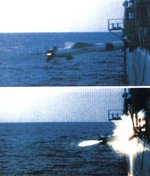Bending the Third Rail
Because We Should, We Can, We Do
Cost of the War in Iraq
(JavaScript Error)
Wednesday, August 16, 2006
Close
 Ray Close, a former CIA intelligence officer on Arab affairs, wrote a piece in Juan Cole's blog today outlining the case for why the U.S. continues to plan for an attack on Iran. The whole thing is a good read. I wanted to particularly look at two tactical issues he discusses which don't get much media attention:
Ray Close, a former CIA intelligence officer on Arab affairs, wrote a piece in Juan Cole's blog today outlining the case for why the U.S. continues to plan for an attack on Iran. The whole thing is a good read. I wanted to particularly look at two tactical issues he discusses which don't get much media attention:A. The Lebanon conflict substantiates pre-crisis intelligence that Iran has apparently provided sophisticated “strategic” rockets to Hizballah, such as the Fajr-5 (range: 75 km) and probably also the Zelzal (range: 150 km).While Close says that the long arm of American military is the only force capable of defanging Iran's missiles, I think he means that this is what the Cheney administration thinks. The wars in Iraq and Lebannon have directly shown the limitations of a vastly superior military power in winning over an assymetrical enemy.
Possession of the Zelzal (or even the Fajr-5) would effectively negate much of the strategic value of attempting to protect Israel’s northern regions from attack simply by making the area south of the Litani River into a buffer zone without fully disarming Hizballah and ensuring that it cannot be resupplied --- a goal almost certainly beyond the capabilities of forces presently available. Because the competence of the Lebanese Army is greatly in doubt, and the military and political mandate of a U.N. peacekeeping force is likely to be both tenuous and impermanent, the long-term value of the recent Israeli action against Hizballah is very much in question.
...
The only real defense against this new kind of threat available to Israel today is the total cessation of Iran's support for organizations like Hizballah and Hamas, and the denial to them of operational bases in Palestine, Lebanon or Syria. Only the long reach of American military power has any chance of achieving that objective on Israel's behalf. Undertaking that effort would be a strategic commitment that went very far beyond traditional American policy of sympathy and support. We are talking here about an historic new departure in American foreign and defense policy, the costs and risks of which the American people have not yet even begun to understand, much less aceept.
B. Hizballah’s successful use of the C-802/SACCADE anti-ship cruise missile against an Israeli corvette caught both the U.S. and Israel by surprise. The general consensus among defense intelligence analysts is that Iran’s small cadre of IRGC operatives attached to Hizballah (estimated to be about 100 men) helped arm this weapon and guide it to its target. Hizballah’s successful use of the C-802 also raises questions about the safety of U.S. warships in the Persian Gulf in the event of Iran’s closure of the Strait of Hormuz in reaction to U.S. military action against the Teheran regime. Iran reportedly has “hundreds” of these missiles (C-802s) lining its shore of the Strait.I can provide the quick shorthand commentary on what Close means here.
Oil.
While military power alone is unlikely to control this threat, the cut-off of middle eastern oil to the U.S. would easily be enough to convince all those latte'-sipping-cellphone-using-SUV drivers that a war to protect the Gulf of Hormuz is a must. Don't be surprised to see a "Gulf of Tonkin" incident occuring sometime in the near future, .... like around October sometime?
2 Comments:
 Lynne said...
Lynne said...
Paul Sperry's book Crude Politics is a great read on this subject.
 Anonymous said...
Anonymous said...
In case of another Tonkin, draft is inevitable. And guess who's going to get drafted first - it's not those SUV driving morons and their kids.
About Me
- Name: Greyhair
- Location: Wine Country, California
I'm a very lucky person with every allergy known to man but still happy to be enjoying a wonderful life living in the best place in the world!
Blogroll
The Big PictureBillmon
Blah3.com
Born at the Crest of Empire
Eric Alterman
Eschaton
FireDogLake
Feingold's Blog
Dan Froomkin
The Huffington Post
Hullabaloo
The Illustrated Daily Scribble
Jesus General
Juan Cole
Matilda's Advice and Rants
Mia Culpa
MsJan Quilts
Needlenose
The Oil Drum
Political Animal
Political Wire
Spooks of the Ozarks
Talk About Corruption
TalkLeft
Think Progress
War and Peace
The Washington Note